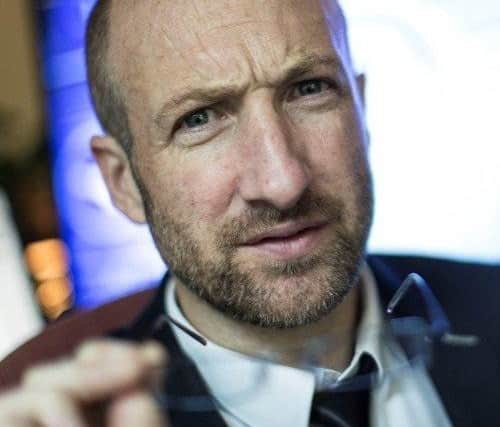IN-DEPTH: Spotlight upon NI polling firm LucidTalk intensifies over its internet-based opinion results which show strong Irish unity support


The issue of how the company arrives at its results is one the News Letter has probed for a long time, due to the influential nature of LucidTalk’s findings, particularly when it comes to the question of Irish reunification.
The firm has found very high support for Irish unity in its polls – something which could be of constitutional significance, since all that is required to spark a referendum is that the UK government believes support for Irish unity is strong enough to win a vote.
(More on that at the bottom of this story)


Advertisement
Hide AdAdvertisement
Hide AdLucidTalk generally works by getting people to fill in questionnaires over the internet.
These people are drawn from a pool of volunteers, many of whom put themselves forward for the pool after seeing invitations circulated on social media.
The firm made the headlines again this week thanks to a new poll showing that voter support for the DUP had plunged to 13% – equal with the SDLP and Alliance, behind the UUP and TUV (16% and 14%), and way below Sinn Fein (25%).
The News Letter has been seeking to shine a light on the way LucidTalk’s polls are conducted ever since 2018, and yesterday it was the BBC’s turn, as Stephen Nolan spent much of his radio show grilling Mr White on his methodology.


Advertisement
Hide AdAdvertisement
Hide AdAt one point Mr White said his firm receives an average of about 1.6 to 1.7 responses per IP address.
– WHAT IS AN IP ADDRESS AND WHY DOES IT MATTER? –
An IP address is basically like a telephone number.
Just as everyone who uses a phone has a unique number, so everyone connecting to the web has a unique IP address.
Your phone will have its own IP address, as will your television, and your laptop.
Sometimes, particularly if someone is browsing the web in their own home, all the internet signals in that home will be channelled through a “router” (like a BT box) – so all devices connecting to that router share the same IP address.
Why does this matter when it comes to filling in surveys?
Advertisement
Hide AdAdvertisement
Hide AdBecause LucidTalk allows only one survey response to come from each email address, it permits multiple responses to come from a single IP address.
For example, imagine a husband and wife are both part of the LucidTalk polling pool.
They each fill in a LucidTalk questionnaire using their respective email accounts, on their respective mobile phones.
Both their responses will be shown as coming from a single IP address – that of their home router.
Advertisement
Hide AdAdvertisement
Hide AdAnd that is perfectly acceptable ... so long as everyone is being honest.
Accepting multiple survey responses from a single IP address could also mean a dishonest individual may be able to sit at home and fill in the same questionnaire two or three times in order to skew the results – all the while using different email accounts, but the same IP address.
What is more, nowadays people can change their IP address with great ease.
Just switching your phone from WiFi to data will generally give you a different IP address, for example.
And then there are VPNs.
Advertisement
Hide AdAdvertisement
Hide AdThese give users a false IP address, masking a phone or laptop’s true identity even if the signal is going via a router.
This is all entirely legal, and VPNs are becoming a commonplace tool for security-conscious web users.
So, in summary, if LucidTalk receives an average of 1.7 responses per IP address, that could mean that the 2,400 responses in LucidTalk’s most recent poll came from only around 1,400 different IP addresses – raising the possibility that some people could be gaming the system.
Mr White was reached by telephone yesterday evening, but was too busy to speak.
Advertisement
Hide AdAdvertisement
Hide AdHe issued a brief statement stressing his methodologies are well-accepted by major players in the polling industry.
He said: “The methodology used in all LucidTalk poll-surveys, including the recent LucidTalk-Belfast Telegraph summer quarterly NI ‘tracker’ poll is globally recognised, and used by all major market research and polling companies worldwide, including in the UK by members of the British Polling Council of which LucidTalk is a member.”
– TENSE EXCHANGES ON NOLAN SHOW –
Here is the transcript, compiled by the News Letter, of the conversation between Bill White (BW) and Stephen Nolan (SN) on August 30.
SN: I just want you to help me understand how these polls are actually done, because here you are today saying Paul Givan is the worst performing unionist leader. And this is based on an internet opinion poll. You have a LucidTalk opinion panel of how many people?
BW: It’s about 13,900 at the moment.
SN: Do you know any of their names?
Advertisement
Hide AdAdvertisement
Hide AdBW: We know their email addresses. We know that they are individuals. Each person that takes part only gets an individual link, Stephen – we’re getting a bit technical here – which can only be used once. It’s one-man-one-vote. Each person, we do an IP address analysis, which your technical listeners will probably understand. So we only take a very small number, a set number, of responses from one IP address, so we can guarantee....
SN: How many responses do you take per IP address?
BW: Oh no, that depends actually on each area that we analyse. It gets a bit technical.
All I’m saying is we take a very small number, which we got to cope with husband and wife teams – a husband and a wife are two votes.
SN: ... Do you not allow the same IP address to be used more than how many times?
Advertisement
Hide AdAdvertisement
Hide AdBW: Normally it averages out about twice, because we have to allow for husband and wife teams.
SN: What do you mean averages out? Is it twice, or is it more than twice?
BW: No, no, it average ... it’s more, no, it’s not more than twice... the average is probably about 1.6 to 1.7 per IP address. That’s the way it works ...
Each person gets an individual link that they can’t change. It must be them and they must take the survey on the device they receive the link. So they have to take it on that device. Once it’s used, it’ll come up with a message. If you go back and click on it again, it’ll come back with a message saying you’ve already voted ...
Advertisement
Hide AdAdvertisement
Hide AdIt’s difficult to start getting into the technical detail of this online. All I’d say is we’re members of the British Polling Council, the UK Market Research Society, we’re exactly the same as YouGov, Survation, and we work closely with world-renowned names. It’s exactly the same technology and methodology.
– ‘YES, PEOPLE COULD SKEW THE POLL RESULTS... BUT IT IS A LOT OF EFFORT AND NO-ONE WOULD BOTHER’ –
A recurring refrain from Mr White was that the details of how he collects opinion data are complicated, and hard to explain in a simple manner.
Mr Nolan replied: “I don’t think it is too technical for our listeners. I think if we’re churning out figures from any polling company, then we need to understand how it’s collated.”
Their exchange continued as follows:
Advertisement
Hide AdAdvertisement
Hide AdSN: You say, Bill, on your website you must be on the electoral register to be able to be part of your panel. If you don’t ask for people’s names or indeed addresses – and you don’t – how do you know they’re on the electoral register?
BW: We don’t actually absolutely know that. We do a periodic audit ... we actually trust people on that to a certain extent ... we can’t be absolute on that. But what we do is we actually do an audit on that periodically.
SN: How do you do an audit if you don’t know who they are?
BW: Most email addresses say, they do actually reflect the person’s name, Stephen.
SN: ... No they don’t.
BW: Oh yes they do. Most email addresses do, Stephen, now. That is a fact. You are [email protected].
SN: I have about 10 different email addresses.
Advertisement
Hide AdAdvertisement
Hide AdBW: Exactly, yes. People can use different email addresses. That’s true. But the point is we actually periodically check the ones we can identify.
SN: How do you periodically check someone that might have made up an email address?
BW: It’s not absolutely 100% in term of actually verifying that. It’s just one of the audits ... we only take a certain number of responses from each area, from each IP address, also from each area – from south Belfast, from west Tyrone, etc, etc. So it’s impossible, hear me out Stephen, it’s impossible as some people would suggest for hundreds of people to go on and actually try to load the poll. They can’t do that.
Unless they do it in a very organised way from a whole lot of different areas over Northern Ireland. Which would take an enormous amount of organisation, and which nobody would be bothered doing.
Advertisement
Hide AdAdvertisement
Hide AdSN: I personally am aware of political parties and political lobbyists going for massive organisation, Bill, in order to skew public opinion.
We see this throughout the world now don’t we? Trolling campaigns and call centres set up with people actually designed to influence social media. Which is why I think this discussion is really important today. You say you also – as part of your audit – take a sample of where these people are in NI. How do you know where they’re living?
BW: Because of the IP address Stephen. You know, people’s IP address. IP addresses are related to a particular area. Also we do the periodic audit vis-a-vis the electoral register just to check there’s a set number of names, that that name, the name that’s identified in the email address, comes from that area or that particular constituency.
SN: Hold on a minute. This is important. To register for your opinion panel, all you need to do is give any email address. You could’ve made it up 10 minutes before. You could have called yourself [email protected] .
BW: Mmhm.
SN: So you don’t know what the names are of these people.
BW: No, no, quite rightly. It’s 100% confidential.
Advertisement
Hide AdAdvertisement
Hide AdLater in the show, Mr Nolan said senior security sources had told him they believed that there were “organised social media bot campaigns,” sometimes often involving orchestrated anonymous accounts in Northern Ireland – the suggestion being that such malicious people could try and scam Mr White’s system.
Mr White went on to say: “I am not saying to you there aren’t people who vote twice.
“There’s a small number of people in our polls who vote twice, but we try to minimise it as much as possible ...
“Why don’t you get the Electoral Office on and talk about the Northern Ireland elections and the level of impersonation ...
Advertisement
Hide AdAdvertisement
Hide Ad“They do their best to make their system as robust as possible, but even they would admit it’s not 100%.
“Ours is 98, 99% one-person-one-vote.”
– PROF CHALLENGES LUCIDTALK CLAIM THAT IT CAN SEE THROUGH VPNS –
An expert on cyber security cast doubt on Bill White’s claims that he can detect where people are based even if they are using a VPN.
Mr White had stressed that he only accepts a certain number of responses from each geographic area, to make sure the results are reflective of the society as a whole.
Advertisement
Hide AdAdvertisement
Hide AdMr Nolan asked how he can know “people are telling you the truth” when they give their location, since these days “the IP address could very, easily be distorted with a VPN”.
Mr White replied: “No, no, that’s not right Stephen ...
“You can actually trace, Stephen, where a response roughly comes from – quite rightly not down to a precise area, but you can say they’re from south Armagh or they’re from north Down or south Belfast.”
Kevin Curran, professor of cyber security at Ulster University, said: “A properly configured VPN will hide a person’s true location. The only IP address a site such as LucidTalk would see is the actual IP address of the VPN.
“There can of course be cases where a poorly configured VPN drops the connection, and therefore leaves the true IP address visible but this should not happen in the vast majority of cases ...
Advertisement
Hide AdAdvertisement
Hide Ad“I would dispute LucidTalk’s claim that they can identify the true location of users who use a VPN.”
– LUCIDTALK AND IRISH UNITY –
Arguably the most significant work LucidTalk produces are its polls on Irish unity, showing untypically-high backing for removing the land border.
In January a LucidTalk poll put backing for Irish unity at 42.3%.
The firm had also produced similar results in 2018.
However, they strongly contrast with those produced by the Northern Ireland Life and Times studies – face-to-face polls of random addresses, run by Ulster University.
Advertisement
Hide AdAdvertisement
Hide AdThese have shown varying support for Irish unity over the years, from a high of 30% in 2006, all the way down to 14% in 2015 – with the most recent figure (2019) showing that only 22% respondents believed Irish unity would be the best long-term policy.
MORE FROM THE NEWS LETTER:
Click here: Northern Ireland polling firm LucidTalk has wrongly claimed it is member of UK professional research body
A message from the Editor:
Thank you for reading this story on our website. While I have your attention, I also have an important request to make of you.
Advertisement
Hide AdAdvertisement
Hide AdWith the coronavirus lockdown having a major impact on many of our advertisers — and consequently the revenue we receive — we are more reliant than ever on you taking out a digital subscription.
Subscribe to newsletter.co.uk and enjoy unlimited access to the best Northern Ireland and UK news and information online and on our app. With a digital subscription, you can read more than 5 articles, see fewer ads, enjoy faster load times, and get access to exclusive newsletters and content. Visit www.newsletter.co.uk/subscriptions now to sign up.
Our journalism costs money and we rely on advertising, print and digital revenues to help to support them. By supporting us, we are able to support you in providing trusted, fact-checked content for this website.